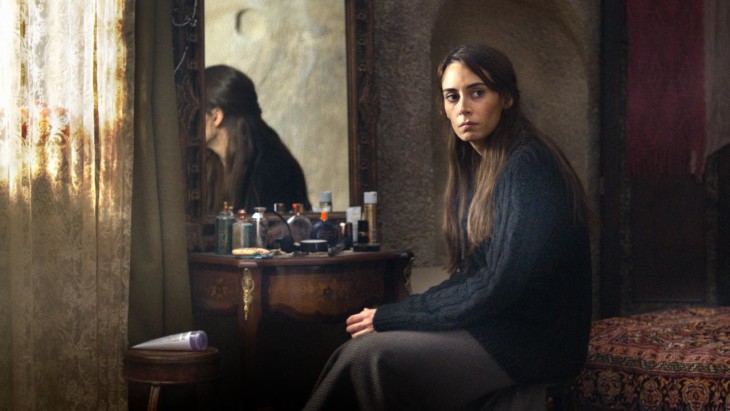For 2014 Palme d’Or winner Winter Sleep [Kış Uykusu], a film that evokes the placidity of hibernation, there exists a profoundly existential restlessness. In Turkish director Nuri Bilge Ceylan’s latest lumbering 196-minute endurance test, an adapted amalgamation of two Anton Chekhov works, “The Wife” and “Excellent People,” hostilities between class and age divides are examined with a sense for literal and metaphorical claustrophobia. Beginning with a prolonged shot of smoldering brush in a field, Ceylan prepares his viewers for the slow-burning degradation of human relations.
Retired actor-turned-landlord Aydin (Haluk Bilginer) is introduced in his element, self-described “king” of his small mountainside kingdom, a hotel in rural Cappadocia, with his much-younger wife Nihal (Melisa Sözen). Initial tensions between Aydin and his community simmer over in the tourist off-season when young village boy Ilyas (Emirhan Doruktutan) hurtles a rock at Aydin’s passing vehicle as an act of retaliation against Aydin’s repossession of his family’s home appliances and their looming eviction. After chasing down the child, Aydin and his loyal foreman Hidayet (Ayberk Pekcan) return Ilyas to the underprivileged residence where his family owes months of back rent. Under the influence, father Ismail (Nejat Isler) deems the gesture a public humiliation and violently rails against Aydin’s passive-aggressive tyranny, especially considering the landlord witnesses the entirety of events unfold from inside his vehicle. Winter Sleep utilizes this preliminary window into Aydin’s influence as a larger gateway into a harrowing examination of the bond between his recently divorced and incendiary sister Necla (Demet Akbag), who is staying on his estate; naturally, Aydin deems this permission as a charitable act.
Written by director Ceylan and his wife Ebru, separated by seventeen years in age, the oppressive and tightly edited dialogue in the forthcoming scenes possesses an air of autobiography comparable to the chamber dramas of Ingmar Bergman. Autumn Sonata (1978), which involves an emotionally catastrophic reunion between estranged mother and daughter, prominently serves as the spiritual seasonal model for Winter Sleep, possessing the same tonally burdensome confrontation and repeated scrapes with past humiliation. One may also see the congruous relationship with the final act of Richard Linklater’s Before Midnight (2013) where the confines of a typically welcoming space are rebuilt into a piece of menacingly cramped architecture; particularly, as Necla infiltrates Aydin’s womb-like study to comment on one of his recent newspaper columns, she ploddingly delves into a biting criticism of the pure insincerity of his existence.
Badly receiving his sister’s remarks, Aydin contemptuously seeks to mend his pride by undermining his wife’s philanthropic efforts to raise money for disadvantaged schools. Ceylan structures their discourse in terms of duration; each argument feels progressively lengthier and severer than the next, built around the first act’s proposed philosophical theme of surrendering to evil — to let it run its course as a sort of moral end. Essentially, this discussion views the political theorist Edmund Burke’s quote, “All that is necessary for evil to triumph is that good men do nothing,” as a course for positive resolution. The interest of Winter Sleep lies in the ambiguities of inaction versus action, observing the complications of enduring human connections that involve the interplay of personal duty, familial regard, and romance. At a couple points during Aydin and Nihal’s heated quarrels, the proverb “The road to hell is paved with good intentions” is insultingly whipped like the very rock thrown at Aydin’s vehicle in the opening minutes. After Aydin has broken Nihal’s confidence in her own initiative with vague notions imbued with personal paranoia, she cuts at the root of his paradoxical spirit. There isn’t an altruistic angle for any of his charitable advice or deeds; he has only succeeded in molding her in his image like he’s carefully tended his own throne of disdain.
Ultimately, while Winter Sleep‘s hypnotic rhythm bears the mark of classical theatricality, its emotional intensity is not quite matched in visual splendor. Working in the beautiful deadness of the craggy Turkish countryside that further provokes Aydin’s self-doubt, Ceylan and cinematographer Gökhan Tiryaki occasionally meander through its barren crevices as if attempting to unearth a long-buried secret. But moments of pensive isolation in Aydin’s routine seem scarcely represented in the film’s sweeping look at personal collapse. If there’s a final bit of redemption in artistic preference, it’s the recurring melancholic motif of Franz Schubert’s “Piano Sonata 20 in A Major.” As described by pianist Paul Lewis, the deliberateness of the piece contains “no feeling of calm” as if “something [is] about to explode beneath the surface,” perfectly evocative of Ceylan’s esteemed drama.

